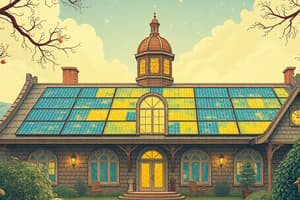Podcast
Questions and Answers
What is the primary energy source used in hydropower generation?
What is the primary energy source used in hydropower generation?
- Wind
- Falling water (correct)
- Sunlight
- Geothermal heat
In 'run-of-the-river' hydropower systems, how is water captured?
In 'run-of-the-river' hydropower systems, how is water captured?
- Through massive reservoirs
- By artificially pumping water
- By diverting ocean water
- Only when it appears naturally (correct)
What is the main function of turbines in hydropower generation?
What is the main function of turbines in hydropower generation?
- To control the water flow
- To create electricity from steam
- To cool down the water
- To convert falling water energy into electricity (correct)
How do solar panels primarily generate electricity?
How do solar panels primarily generate electricity?
Why are run-of-the-river hydropower systems considered more efficient compared to conventional hydro schemes?
Why are run-of-the-river hydropower systems considered more efficient compared to conventional hydro schemes?
What is the main function of solar panels?
What is the main function of solar panels?
How do wind turbines generate electricity?
How do wind turbines generate electricity?
What is a key advantage of wave and tidal energy compared to solar or wind energy?
What is a key advantage of wave and tidal energy compared to solar or wind energy?
How do wave energy devices generate electricity?
How do wave energy devices generate electricity?
What is a method used in solar panel design to improve efficiency and reduce cost?
What is a method used in solar panel design to improve efficiency and reduce cost?
Flashcards are hidden until you start studying
Study Notes
Generate Electricity from Renewable Sources with Innovative Technologies
Electricity generation is crucial for powering our lives today. With traditional sources like fossil fuels becoming less sustainable due to environmental concerns, there's been increased interest in developing renewable energy technologies. Some of these innovations focus on converting various forms of natural energy into usable electrical current. Here we explore some of these innovative approaches.
Hydroelectric Power Generation
Hydropower has become one of the most widely used methods for generating electricity from renewable resources. It involves using the force of falling water to push turbines and generate electricity. This technology uses existing bodies of water such as rivers and lakes, which makes it particularly attractive because many countries already have this resource available.
One example of hydropower innovation comes from the design known as 'run-of-the-river.' Unlike conventional hydro schemes where dams store reservoir water until needed, run-of-the-river systems only capture water when it appears naturally, often resulting in more efficient operation without requiring large amounts of storage space or infrastructure costs associated with storing vast quantities of water behind dam walls.
Solar Energy Conversion Systems
Solar panels are another common form of renewable energy conversion system. They convert sunlight directly into electricity by absorbing photons within their semiconductor materials—usually silicon—and releasing electrons. These electrons flow through conductive wires creating an electric current, just like any other source powered by burning fuel would create heat and steam driving generators.
Innovative solar panel designs aim at improving efficiency while reducing cost per watt produced. One method is thin film manufacturing processes that allow manufacturers to further reduce material usage leading to cheaper unit pricing for end consumers.
Wind Turbine Technology Advances
Wind turbine technology has come a long way since its inception; modern wind farms can now produce enough clean electricity for hundreds of thousands of homes daily. Modern wind turbines rotate in response to air pressure differences between their tips and bases, much like sails catching winds aboard ships.
Advanced control algorithms help optimise performance under varying wind speeds ensuring maximum output even during periods of low gusts. Furthermore, blade designs continue evolving too - moving away from rigid structures towards dynamic blades capable changing shape throughout rotation cycles enhancing lift profiles offering better performance across multiple speed ranges.
Wave and Tidal Energy Harvesting
Wave and tidal energies offer great potential due to their ever-present nature compared to intermittent sunshine or inconsistent flows like those seen with river currents.
Tidal barrages erected near estuaries act similarly to dams by obstructing incoming tides, causing water levels upstream rise significantly pushing against barriers installed below sea level creating mechanical torque turning generators located above water surface producing continuous stream 24 hours each day regardless seasonality or weather conditions outside .
Similarly wave energy devices float out beyond shorelines riding swells travelling past them harvesting kinetic motion of waves passing beneath thus transforming oceanic forces straightaway into useful electrical power.
These new technologies are reshaping how we see electricity production, making it possible to tap into previously untapped sources of energy while minimizing harm caused traditionally polluting activities. By embracing creativity and advancements in green tech, humanity can overcome challenges posed by climate change and ensure a sustainable future for all.
Studying That Suits You
Use AI to generate personalized quizzes and flashcards to suit your learning preferences.



